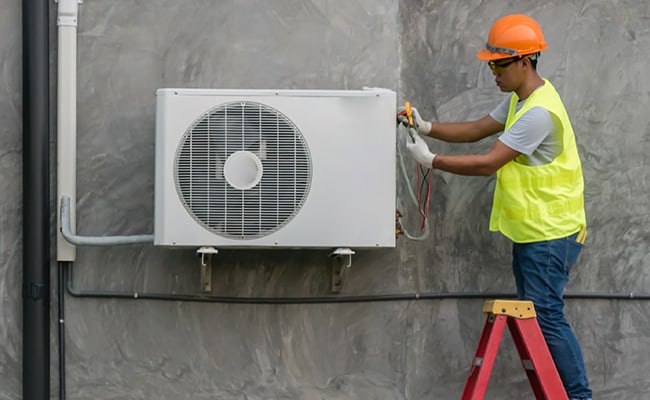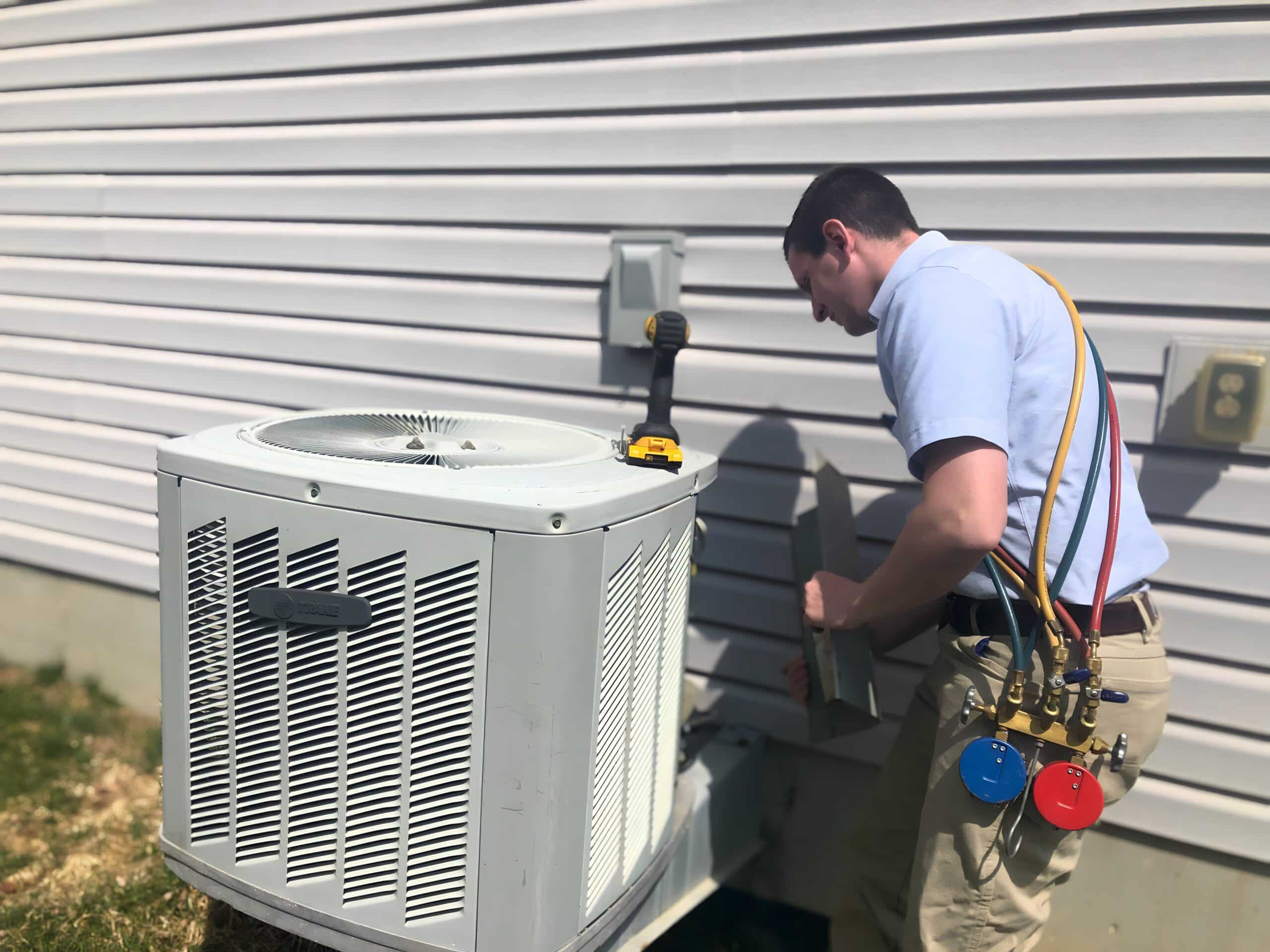Comparing Costs of Repair vs Full furnace replacement
Comparing Costs of Repair vs Full furnace replacement
Blog Article
Picking In Between a Heatpump and Heating System: Key Considerations for Your Heating And Cooling Needs
When evaluating heating options for cooling and heating requires, the decision between a heat pump and a heater can be intricate. Each system provides distinct advantages tailored to certain environments and energy performance objectives. Comprehending these differences is important for making an informed option. Key elements such as setup prices and environmental influence even more make complex the choice process. Which choice truly straightens with one's comfort and sustainability preferences? The following sections will certainly discover these factors to consider in detail.
Comprehending Warm Pumps: Just How They Function and Their Advantages
While several home owners think about numerous heating choices, recognizing just how heat pumps feature and their advantages can considerably affect their decision. Heatpump run by moving warmth instead than generating it. In the wintertime, they remove warmth from the outside air or ground and move it inside your home, while in the summer, they reverse this process, cooling down the home by expelling warm outside. This twin capability makes them functional for year-round climate control.One of the primary advantages of heatpump is their power efficiency. They make use of substantially much less electrical energy contrasted to conventional heating unit, potentially leading to lower utility expenses (heat pump installation ooltewah tn). In addition, heatpump have a smaller carbon footprint, making them an environmentally pleasant selection. They likewise need much less maintenance than traditional systems, contributing to long-lasting expense savings. Overall, understanding the mechanics and advantages of heatpump can assist house owners make notified choices regarding their home heating and cooling down demands
Discovering Heaters: Types, Operation, and Advantages
Heaters come in different kinds, including gas, electric, and oil models, each with distinct functional systems. Recognizing these differences is crucial, as they impact efficiency and home heating efficiency. Additionally, heaters offer many advantages, such as constant warm result and dependability in chillier climates.
Sorts of Heating systems
Furnace can vary considerably in design and operation, with furnaces being a preferred selection among property owners. There are several kinds of heating systems, each utilizing various fuel sources and technologies. Gas heaters are typical, leveraging gas to create warmth effectively. Electric furnaces, on the other hand, use electric resistance to generate heat, commonly favored for their uncomplicated setup. Oil heaters, while less common, are reliable in areas with minimal gas access (heat pump installation ooltewah tn). Furthermore, condensing furnaces take full advantage of energy effectiveness by reusing and recording exhaust gases. Each type runs through a system of heat exchangers and ductwork to distribute cozy air throughout a home. Understanding the differences in between these furnace types is crucial for notified cooling and heating decisions
Advantages of Furnaces
For house owners looking for trusted warmth during chilly months, the advantages of heaters are substantial. Furnaces provide constant home heating, making certain also temperatures throughout the home. They are particularly effective in extreme chilly, usually exceeding heat pumps in icy problems. Different kinds, consisting of gas, electrical, and oil heating systems, use adaptability to fulfill varied needs and preferences.Furnaces also often tend to have reduced preliminary installment expenses contrasted to heatpump, making them an extra available option for numerous. Their robust design adds to a longer life-span, with many devices lasting over 15 years with appropriate upkeep. Additionally, modern-day furnaces are usually geared up with sophisticated modern technology for boosted performance, which can lead to reduced power bills. Overall, heaters continue to be a dependable choice for reliable home heating.

Energy Effectiveness: Contrasting Heat Pumps and Furnaces
When comparing energy performance between warmth pumps and heaters, the Seasonal Energy Performance Ratio (SEER) plays a crucial function in identifying efficiency. Additionally, an operational price analysis exposes the long-lasting economic ramifications of each system. Comprehending these elements can direct property owners in making informed choices regarding their heating services.
Seasonal Energy Effectiveness Ratio
Power effectiveness plays a crucial duty in the decision-making process in between heatpump and heaters, especially when thinking about the Seasonal Power Performance Proportion (SEER) This statistics measures the cooling effectiveness of heatpump over a whole air conditioning period, giving a standard means to evaluate efficiency. Greater SEER scores show better power effectiveness, converting to reduced power usage and decreased utility costs. On the other hand, furnaces are typically evaluated utilizing the Annual Gas Utilization Effectiveness (AFUE) score, which reflects heating effectiveness. When comparing these two systems, homeowners should prioritize SEER rankings for heatpump, as they directly impact total energy cost savings and environmental sustainability. An extensive understanding of SEER can significantly influence the lasting contentment and cost-effectiveness of the selected HVAC solution.
Functional Cost Evaluation
Comprehending the operational prices connected with heatpump and heaters is crucial for property owners examining their choices. Heatpump commonly use higher power effectiveness, converting electrical power right into warmth with very little waste. This results in lower regular monthly energy bills, particularly in moderate environments. Conversely, typical heaters, particularly gas designs, may have reduced upfront expenses yet can incur higher functional expenses in time due to sustain rates and effectiveness ratings.Moreover, heat pumps can operate as both home heating and cooling systems, potentially lowering the need for different a/c devices. While initial financial investments for heatpump may be greater, their long-lasting savings in energy effectiveness can make them an extra economical selection for many homes. Mindful analysis of local energy prices is important to figure out the most effective option.
Setup Expenses: What to Anticipate for every Heater
Setup expenses for furnace can differ significantly in between warmth pumps and furnaces, influencing house owners' choices. Warmth pumps generally have higher ahead hop over to here of time installation costs, usually varying from $3,500 to $8,000, relying on the device dimension and complexity of setup. This includes the outdoor unit, interior handling system, and essential ductwork alterations. Alternatively, heaters often tend to have reduced first prices, balancing in between $2,500 and $6,000, which can be appealing for budget-conscious house owners. Installment expenses can raise if extensive ductwork is required.Moreover, the selection of fuel kind for heating systems-- natural gas, gas, or electric-- can additionally influence installation prices. While heatpump offer power efficiency, their first financial investment may prevent some customers. Inevitably, examining setup costs together with long-term financial savings and effectiveness will certainly assist property owners in making informed choices regarding their heater.
Environment Considerations: Which System Executes Much Better in Your Area
How do environment conditions affect the effectiveness of furnace? The performance of heatpump and furnaces can differ significantly relying on the regional environment. In moderate environments, heat pumps stand out by efficiently moving heat from the outdoors air, making them an energy-saving alternative. Nevertheless, their performance lessens in very chilly temperatures, you can check here where they might battle to extract adequate heat. On the other hand, heating systems, particularly gas versions, provide reputable and regular warmth no matter outside problems, making them better in colder regions.In areas that experience milder winters months, heatpump can operate efficiently year-round, providing both heating & cooling. In contrast, regions with rough winter seasons usually gain from the effectiveness of heaters. Ultimately, recognizing the neighborhood environment is crucial when determining between a heatpump and a furnace, as it directly impacts their operational effectiveness and overall performance.
Upkeep Requirements: Long-Term Take Care Of Warmth Pumps vs. Furnaces
While both heatpump and furnaces require normal maintenance to assure peak performance, their details demands and care routines vary significantly. Furnaces usually require less regular interest, with annual inspections being enough to look for gas leakages, clean filters, and analyze general functionality. Their less complex style frequently permits uncomplicated repairs.In contrast, warmth pumps necessitate semiannual maintenance as a result of their double duty in home heating and cooling. This includes cleansing coils, checking refrigerant degrees, and making certain that both the indoor and exterior systems work at their best. Additionally, heatpump maintenance typically includes more detailed parts, making specialist servicing essential.Neglecting maintenance can result in lessened performance and enhanced power prices for both systems. Ultimately, property owners must take into consideration these long-term treatment requirements when choosing between a warm pump and a heater, as aggressive maintenance can extend the life-span and performance of either system considerably.
Environmental Influence: Choosing a Sustainable Heating Choice
The ecological impact of heating systems is a vital analysis for home owners seeking sustainable choices. Heatpump are generally much more energy-efficient than traditional heating systems, as they transfer warm instead than generate it, significantly decreasing carbon discharges. By utilizing sustainable energy sources, such as geothermal or air-source heatpump, property owners can better lessen their eco-friendly footprint.On the various other hand, natural gas furnaces release greenhouse gases and add to air contamination, though they usually offer higher heat outcome. Innovations in modern technology have actually led to the development of high-efficiency heating systems that minimize emissions.Ultimately, choosing a home heating system involves evaluating efficiency versus environmental effect. Homeowners are urged to review local energy sources and incentives for renewable systems, guaranteeing a selection that aligns with both personal convenience and environmental duty. The choice influences not only prompt convenience however likewise long-lasting sustainability and environmental wellness.
Often Asked Inquiries
For How Long Do Warm Pumps and Furnaces Generally Last?
The life-span of warmth pumps typically varies from 15 to two decades, while furnaces can last between 15 to three decades. Regular upkeep considerably affects their long life and efficiency in giving heating services.
Can I Use a Heat Pump in Extremely Cold Climates?
Heatpump can operate in exceptionally cold climates, however their performance reduces as temperatures decrease. In such conditions, supplemental heating resources may be needed to maintain comfortable interior temperature levels and guarantee peak efficiency.

What Is the Sound Level of Heat Pumps Versus Furnaces?
The sound levels of warm pumps and furnaces differ substantially. Generally, heatpump operate even more quietly than traditional heaters, making them better for those sensitive to sound, while furnaces might produce louder functional sounds throughout heating cycles.
Are Warm Pumps Suitable for Both Cooling And Heating?
Heat pumps are without a doubt appropriate for both heating and cooling (heat pump replacement ooltewah tn). They function by moving warmth, offering reliable temperature control year-round, making them a functional selection for property owners looking for an all-in-one HVAC solution
What Dimension Heating Unit Do I Required for My Home?
Figuring out the ideal size furnace for a home calls for examining variables such as square footage, insulation top quality, regional environment, and the home's format. Consulting a professional can ensure an accurate evaluation and excellent comfort. Heat pumps usually supply higher energy performance, transforming electric energy right into heat with very little waste. In modest environments, heat pumps stand out by successfully moving heat from the outside additional reading air, making them an energy-saving alternative. Alternatively, heating systems, specifically gas designs, offer constant and trustworthy warmth regardless of exterior conditions, making them more effective in cooler regions.In locations that experience milder winter seasons, warm pumps can run successfully year-round, providing both heating and cooling. Heat pumps are typically a lot more energy-efficient than typical heaters, as they move warmth rather than generate it, greatly decreasing carbon discharges. By utilizing sustainable energy sources, such as air-source or geothermal warm pumps, homeowners can even more reduce their ecological footprint.On the various other hand, natural gas heating systems give off greenhouse gases and contribute to air pollution, though they frequently offer higher warmth output.
Report this page